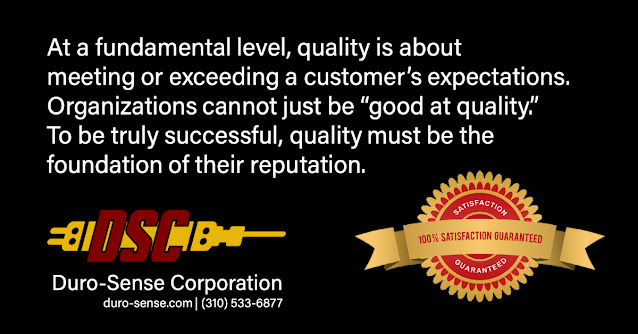Mistakes, failures, and recalls tend to attract people's attention and make them focus on the negative. They show us what a lapse in quality can mean to a company. The consequences of a lapse in quality tend to be much more prominent today than they have been in the past, due primarily to the complexities of today's economy and supply chain. However, despite the impact these types of failures could have on a company, they are only part of the story. While stopping losses like this from occurring is essential, focusing on them too much can skew a company's understanding of the true meaning of quality.
Quality is about meeting or exceeding customer expectations. The value is greater customer satisfaction and higher productivity, greater efficiency in operations, even innovation and employee engagement. However, companies face many obstacles. Rising labor costs, material costs, freight costs, and many other costs inflate overhead and limit how much companies can spend on quality practices. Therefore, organizations cannot just be good at quality. They need to be smart about it, too.
To achieve the proper balance, companies must think about quality systematically. The first step is to listen to the voice of the customer clearly, while at the same time stabilize their operating system. Once these applications take hold, the next step is to strengthen corporate and individual accountability and interdepartmental collaboration for quality, including new quality performance standards. These standards affect product design and supply chain management. The next step in this process is to have quality influence an organization's decision-making to the point that it changes the corporate culture and becomes essential to every aspect of operations. The outcome is quality becomes the basis for the company's reputation.
At a fundamental level, quality is about meeting or exceeding a customer's expectations. Organizations cannot just be "good at quality." For meaningful success, quality must be the foundation of their reputation.
Duro-Sense Corporation has spent a great deal of time, energy, and expense to build that reputation for unsurpassed quality. Our company developed a quality management system to satisfy our customers' needs better and improve the company's management and operation. Our quality system, DSQ-2000, follows the international standard ISO 9001. ISO 9001 is a quality standard whose goal is to imbed a quality management system within an organization, increase productivity, reduce unnecessary costs, and ensure the quality of processes and products. In addition to ISO 9001, DSQ-2000 also meets the requirements of AS 9100. AS 9100 is an aerospace specification that fully incorporates ISO 9001 while adding additional requirements relating to quality and safety. After both of these standards, we have also established compliance with the current versions of the following standards relating to different aspects of quality: ANSI/NCSL Z540, BAC 5621, AMS2750, ISO 17025, ISO 10012, ASTM E220, ASTM E230, ASTM E207, ASTM E29.
Quality is integral to how we operate. Likewise, we flow down these quality requirements to our supply chain. To mitigate the quality risks and costs involved in sourcing, we have implemented an audit process for all existing and potential suppliers. Doing so ensures that our supply chain delivers high-quality products, operates efficiently, and supports continuous improvement. In effect, they become an extension of our company and must strive to meet the exacting standard we hold ourselves and our clients retain us.
The American Heritage Dictionary defines quality as "inherent or distinguishing characteristics, a degree or grade of excellence." The ISO definition of quality is "The totality of features and characteristics of a product or service that bear on its ability to satisfy stated or implied needs." Duro-Sense defines quality as "a mark of uncompromising standards and high achievement for which we strive every day."
Duro-Sense Corporation
310-533-6877
https://duro-sense.com
